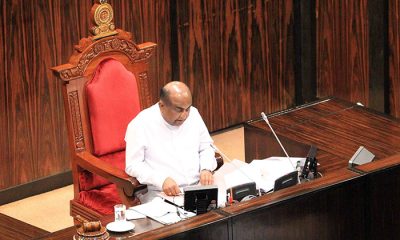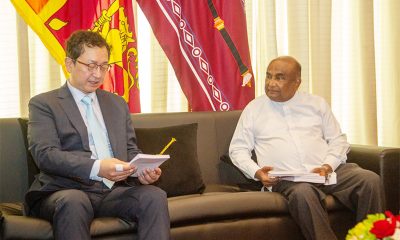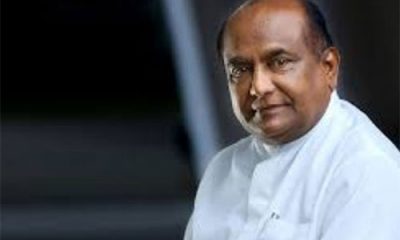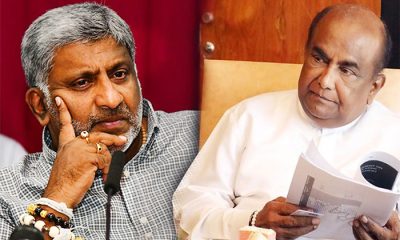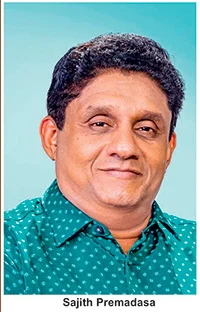Midweek Review
Schoolchildren gather at a House on fire with shocking revelations
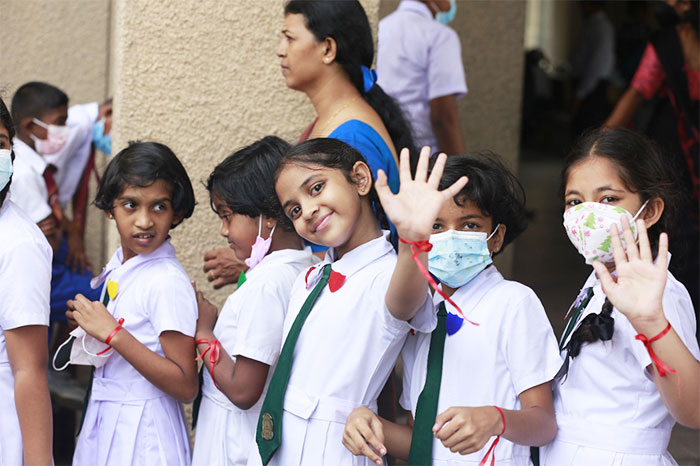
By Shamindra Ferdinando
Narendra Fernando, Sergeant-at-Arms of the crisis-ridden Parliament, has declared that the largest number of students, in the post-independence era, visited the House on Thursday (Dec. 01).
Director, Legislative Services, Janakantha Silva, who is also the Acting Director of Communication, quoted Fernando as having said that approximately 5,000 students, from 32 schools, received permission to visit Parliament on that day. The top official was further quoted as having said that was a world record.
According to the statement, issued by Parliament, last Thursday, since the re-opening of Parliament for students on Sept, 19, 2022, the House received over 25,000 schoolchildren. Declaring that schoolchildren have been allowed, as per a decision taken by the Committee on Parliamentary Business, chaired by Speaker Mahinda Yapa Abeywardena, the Parliament appreciated the support extended by President Ranil Wickremesinghe, in his capacity as the Finance Minister, for the initiative taken by the House.
President Wickremesinghe has also assured funds required to provide a free glass of milk for each school child, visiting Parliament from next month. The House declared that this move received the blessings of both the government and the Opposition.
The government and Opposition owed an explanation as to what they really expected to achieve by allowing schoolchildren to observe parliamentary and at times unparliamentary debates. The conduct of members of Parliament has deteriorated, over the years, to such an extent, the media, on several occasions, questioned why schoolchildren were exposed to the utterly disgraceful conduct of the people’s uncouth elected members.
The day after the statement, issued by the Serjeant-at-Arms, a clash between Field Marshal Sarath Fonseka and State Wildlife Minister Wimalaweera Dissanayake proved again that the Parliament is certainly not suitable for schoolchildren. The exchange, triggered by the war-winning Army Commander’s disparaging comment on the Digamadulla District lawmaker, over the controversial digging of trenches, underscored the appalling status.
The Gampaha District Samagi Jana Balavegaya (SJB) MP earned the wrath of Wimalaweera Dissanayake for being harshly critical of digging trenches at the latter’s behest to thwart marauding wild elephants causing havoc in peasant homesteads. Fonseka’s declaration that the State Minister’s strategy was foolish enraged the State Minister who called the five- star General Kalawedda (pole cat), Vel Vidane (a somewhat demeaning and distorted translation with not even a hint of military prowess of the term Field Marshal), etc.
How many schoolchildren had been in the gallery when the war-winning General was abused in such a manner because of his own provocation of a self-made man? Wimalaweera Dissanayake has even earned a university degree, through sheer personal perseverance, amidst much adversity. The insinuation by the Field Marshal that the digging of trenches is a ruse to carry out sand mining at an unprecedented scale cannot be ignored. Though in this particular instance cited, it may not have been the case, knowing Dissanayake’s true character. But the crux of the matter is that in a ‘land like no other’ whether anything can be done without the powers that be making money in such usual instances. How many schoolchildren witnessed the exchange between lawmakers Fonseka and Wimalaweera Dissanayake?
Safi Nagar affair
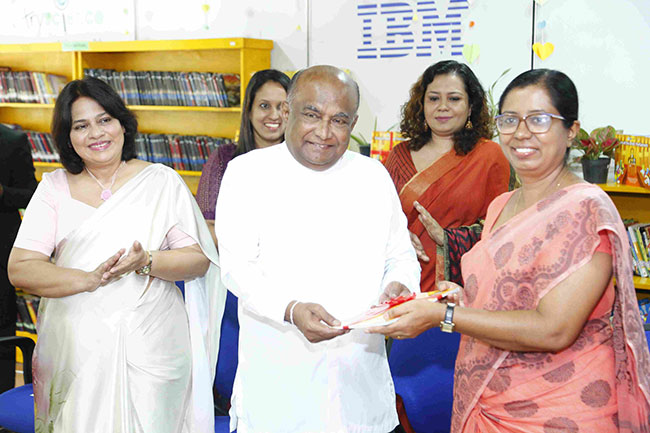
Speaker Mahinda Yapa Abeywardena at the launch of Punchi Dupathe Kurulu Kathandaraya. Chief of Staff and Deputy Secretary General of the Parliament, Mrs. Kushani Rohanadeera, is next to the Speaker
JVP leader Anura Kumara Dissanayake’s attack on Environment Minister Nazeer Ahamed, also on Friday, over Geological Survey and Mines Bureau (GSMB) authorization of a massive sand mining racket in Safi Nagar, in the East, exposed corruption from the highest level to the lowest rung in this vital government institution. The accusations were justified on the basis of a letter Secretary, Environment Ministry, Dr. Anil Jasinghe, has written to Director General, GSMB, Sajjana de Silva, late last month, demanding an explanation, within 14 days, regarding the issuance of an illegal permit for sand mining in Safi Nagar, in the Muttur electorate.
Those schoolchildren, visiting Parliament, must have got a firsthand opportunity to hear how politicians and officials abused their authority. The scale of corruption must have shocked them. Parliament should be ashamed of what is continuing to happen in this bankrupt country.
Environment Minister Nazeer Ahamed never disputed the shocking revelation that GSMB Chairman Dr. Senarath Hewage Prasad Manjula, as the head of a private mining company, called Uptown Ventures, had received a mining license. Manjula has received the appointment, as GSMB Chairman, in Feb. 2022, after the sacking of Prof. Anura Walpola under controversial circumstances.
Before further discussing the happenings, in Parliament, on Friday, let me recall what Manjula’s predecessor, Prof. Walpola, told Pamodi Waravita of ‘The Morning’, in an exclusive interview carried in its online edition, on March 02, 2022. The story, headlined ‘Removed GSMB Chair levels allegations against GSMB DG’, the writer dealt with the circumstances leading to Sajjana de Silva’s appointment as Director General of GSMB. Accordingly, Sajjana de Silva has received the appointment as DG during the Covid-19 lockdown, on the basis of his seniority.
Prof. Walpola has explained that the GSMB board made the appointment, on a temporary basis, as it couldn’t physically meet, due to the Covid-19 lockdown. Sajjana de Silva filled the vacancy created with the retirement of the person who served in that position. The new appointment took effect in March 2020. Walpola is on record as having said that when the GSMB board physically met in June 2020, Sajjana de Silva’s appointment was rejected. However, the DG produced a letter he had received from then Environment Minister S.M. Chandrasena that confirmed his appointment.
Prof. Walpola, who received appointment as Chairman, GSMB, in Dec. 2019, claimed that at the time Sajjana de Silva obtained confirmation he was under investigation by the Financial Crimes Investigation Division (FCID).
In spite of a spate of complaints against the new DG, the Ministry refrained from taking action against him. Prof. Walpola was quoted as having alleged that the DG had the backing of six GSMB personnel, under investigation.
Perhaps, the most interesting disclosure, made by Prof. Walpola, was the issuance of a license to his successor, Prasad Manjula, by DG Sajjana de Silva, contrary to the Mines and Mineral Act. Obviously, the then Environment Minister, the incumbent Minister as well as successive Ministry Secretaries, chose to turn a blind eye.
It would be pertinent to stress that Prof. Walpola lost the chairmanship, of this vital state enterprise, less than two weeks before the GSMB board was to appear before the parliamentary watchdog committee.
Illankai Thamil Arasu Kadchi (ITAK) lawmaker Shanakiyan Rasamanickam first raised the issue at hand at a COPE meeting, on February 23, 2020. The Batticaloa District MP questioned the rationale behind accommodating the proprietor of a mining company as the Chairman of GSMB. Obviously, the COPE lacked the power to intervene. The Gotabaya Rajapaksa administration not only allowed the illegal transaction but also protected the wrongdoers.
Friday’s attacks on the government, over the Safi Nagar affair, should be examined against the backdrop of a despicable project that placed the GSMB in the hands of a person who had been engaged in large scale sand mining.
Those who allowed schoolchildren to observe parliamentary proceedings should be aware the Parliament has nothing to offer except educate them on unbridled waste, corruption, irregularities and mismanagement.
Joint attack on Nazeer
 Statements made by JVP leader Dissanayake, TNA MP Rasamanickam, and SJB MP Ajith Mannapperuma, as regards the Safi Nagar, bared an unbelievable state of affairs. The Parliament dealt with the matter, during the committee stage debate with the JVP, TNA and SJB, demanding why Minister Ahamed protected the culprits. The JVPer largely based his criticism on Dr. Jasinghe’s no nonsense letter, that demanded a plausible explanation, within 14 days.
Statements made by JVP leader Dissanayake, TNA MP Rasamanickam, and SJB MP Ajith Mannapperuma, as regards the Safi Nagar, bared an unbelievable state of affairs. The Parliament dealt with the matter, during the committee stage debate with the JVP, TNA and SJB, demanding why Minister Ahamed protected the culprits. The JVPer largely based his criticism on Dr. Jasinghe’s no nonsense letter, that demanded a plausible explanation, within 14 days.
Having contested the last general election, on the Sri Lanka Muslim Congress (SLMC) ticket, in August 2020, Deputy Leader of that party Ahamed, an engineer by profession, at the onset of the unprecedented political turmoil, switched his allegiance, in April 2022, to President Gotabaya Rajapaksa. Ahamed simply ignored party leader Rauf Hakeem warning of disciplinary action for what he called breach of party discipline.
With the advent of UNP leader Ranil Wickremesinghe, as the President, in July, the Batticaloa District MP received the environment portfolio. Ahamed seems to have so far stood by the GSMB operation. However, Dr. Jasinghe’s missive to DG, GSMB suggested that the Environment Ministry finally responded to continuing criticism over the Safi Nagar affair.
Both print, electronic, including social media, continuously attacked the government over the inordinate delay in taking action against both the DG and Chairman of GSMB. ‘Hiru’ spearheaded the media campaign with aggressive coverage of the developments continuously, until the damaging disclosure in Parliament on Friday.
Lawmaker Dissanayake asked why Uptown Ventures was granted a license to engage in sand mining, in state land, in a clear case of conflict of interest and regardless of a proposal made by another party. The MP has taken up the issue against the backdrop of Dr. Jasinghe’s allegation that DG, GSMB, discredited and abused his position.
MP Rasamanickam declared in Parliament that GSMB Chairman was the person who secured the license to remove 100,000 cubes of sand from Safi Nagar. The MP questioned how an official, who is supposed to ensure transparency and legality in sand mining, received a license for the same? The TNA representative declared his readiness to face any legal challenge. Declaring he had the required evidence to prove his accusations, MP Rasamanickam alleged the DG, GSMB, is responsible for all corrupt activities therein.
The Batticaloa District MP said that if necessary he would call an international press briefing regarding Minister Ahamed’s failure to act on the letter issued by Dr. Jasinghe, to DG, at the centre of the whole sordid deal. The TNA representative demanded the immediate interdiction of the official while warning of consequences in case his demand was not met.
At the onset of his statement, lawmaker Dissanayake asked Minister Ahamed to clarify Sajjana de Silva’s status. Responding to the JVPer’s query, Minister Ahmed said that though being appointed in an acting capacity, Sajjana De Silva has been confirmed in his position.
MP Dissanayake said: Sajjana de Silva received the appointment during S.M. Chandrasena’s tenure as the Environment Minister. The appointment didn’t have the required approval from the management committee of GSMB.
Minister S.M. Chandrasena: At the time, Sajjana de Silva was granted an acting appointment, he headed the seniority list.
MP Dissanayake: At the very beginning, I clarified this matter. I sought and obtained the status of the GSMB official. Though you said Sajjana de Silva was granted an acting appointment, your letter of appointment didn’t say so.
The Parliament was told how a license obtained by Uptown Ventures for the cultivation of chilies, in 3,000 acres of land, permitted the enterprise to engage in large scale sand mining. The project received government sanction for mining of 5,000 cubes of sand, on a monthly basis. The House was asked how the proprietor of Uptown Ventures ended up as Chairman of GSMB. The JVPer pointed out the absurdity in the GSMB Chairman’s defence that he was no longer the head of that venture. But, at the time the illegal sand mining took place, at Safi Nagar, Senarath Hewage Prasad Manjula-led Uptown Ventures, the JVPer declared, reiterating accusations pertaining to the Safi Nagar project.
Pointing out that Dr. Jasinghe’s report identified the GSMB Chairman as one of the persons involved in the corrupt transaction, MP Dissanayake declared the direct involvement of the political leadership in the Safi Nagar operation. Those responsible had been exposed and were now naked before the public. SJB MP Ajith Mannapperuma chided Minister Ahamed for remaining silent. Urging the Minister to come clean, the Gampaha District MP asked why he remained silent when such serious accusations were made against the two top officials of the GSMB. The former UNP MP asked whether Minister Ahamed lacked the backbone to set the record straight.
Minister Ahamed said that as regards DG, GSMB, the Ministry had already issued a charge sheet and that action was in progress. “Likewise, the Chairman’s issue with regard to Safi Nagar, complaint has been lodged with the CID, and the Auditor General Department is evaluating the whole thing. The report will be submitted. Once that is done, necessary action will be taken as per the advice given by all those institutions”, the Minister said.
Dissident SLPP MP Weerasumana Weerasinghe said that there was no need to await the Attorney General’s opinion to take action in respect of repeated disclosure made by ‘Hiru.’ The outspoken Communist Party representative said that Environment Secretary Dr. Jasinghe’s missive to the DG, GSMB, was more than sufficient to take punitive action against the culprits.
Having asked whether Secretary to the President, Saman Ekanayake, was present in Parliament, lawmaker Weerasinghe said there was no point in making grandiose statements at COP27 if the government could not take punitive measures against errant officials. The MP was referring to the 2022 United Nations Climate Change Conference or Conference of the Parties of the UNFCCC, more commonly referred to as COP27, held in Egypt last month. Weerasinghe asked Ahamed whether he chose to safeguard the ministerial portfolio or would handle the issue without fear or favour.
NDI funds House project
Amidst continuing political-economic-social crisis caused by failure on the part of the executive, legislature and judiciary to address issues at hand, the Parliament has launched a new project to educate primary school students. With the financial backing of the National Democratic Institute, the Parliament has launched ‘Punchi Dupathe Kurulu Kathandaraya,’ in Sinhala, Tamil and English to educate those who haven’t even reached their teens of what the Parliament called representative democracy.
The book launch took place at the children’s section of the Colombo Public Library with the participation of Speaker Mahinda Yapa Abeywardena. What really Parliament and NDI hoped to achieve by educating primary students is not clear. Likewise, ongoing efforts to set up ‘parliaments’ at schools, introduce electronic voting et al at a time Parliament failed in its mandatory responsibilities, such as public finance and enactment of laws, may not help restore public confidence in the political party system. Those struggling to make ends meet, as a result of the economic ruination, may be flabbergasted if they hear of silly projects undertaken by Parliament, using meagre resources at a time of unprecedented economic turmoil. May be that money could be better utilized to improve nutritional level of our schoolchildren.
Washington headquartered NDI operates in many countries through its partners and the operation here is no exception. Funded by the US taxpayer as well as other international sources propagating Western values, the NDI project should be examined against the backdrop of a range of US initiatives here. The controversial US role at the 2010 presidential election is a case in point. The US backing for war-winning Army Commander Gen. Sarath Fonseka, at that election, is not a secret, thanks to Wikileaks revelations.
Remember, the USAID funded USD 13 mn (Rs 1.92 bn) project to enhance democracy, transparency and accountability in 2016. That three-year project was launched in the wake of the Central Bank bond scams, perpetrated in Feb. 2015 and March 2016. Did that high profile initiative produce desired results? Seven years after that US initiative and scores of other projects undertaken by successive governments and NGOs, Sri Lanka has ‘achieved’ bankruptcy status.
Midweek Review
BASL fears next set of civil society representatives might be rubber stamps of NPP

CC in dilemma over filling impending vacancies
Sajith Premadasa
Amidst a simmering row over the controversial move to have Deshabandu Tennakoon as the IGP at the time of crucial presidential election, Opposition Leader Sajith Premadasa alleged: “The Speaker sent a letter to the President, recommending the appointment of Deshabandu Tennakoon as IGP. He distorted the Constitutional Council ruling by interpreting the two abstaining votes of civil society members as votes against Deshabandu and used his casting vote to recommend Deshabandu as the Constitutional Council decision. It is on the basis of the Speaker’s letter that the President made the appointment. The Speaker has blatantly violated the Constitution
.”
Speculation is rife about a possible attempt by the ruling National People’s Power (NPP) to take control of the 10-member Constitutional Council (CC). The only way to take command of the CC is to appoint those willing to pursue the NPP agenda as civil society representatives.
Against the backdrop of the NPP’s failure to obtain CC’s approval to finalise the appointment of the Auditor General, the government seems hell-bent on taking control of it. Civil society representatives, namely Dr. Prathap Ramanujam, Dr. (Mrs.) Dilkushi Anula Wijesundere and Dr. (Mrs.) Weligama Vidana Arachchige Dinesha Samararatne, whose tenure is coming to an end in January, blocked President Anura Kumara Dissanayake’s nominee receiving the AG’s position. They took a courageous stand in the greater interest of the nation.
Chulantha Wickramaratne, who served as AG for a period of six years, retired in April 2025. Following his retirement, President Anura Kumara Dissanayake first nominated H.T.P. Chandana, an audit officer at the Ceylon Petroleum Corporation. The CC rejected the nomination. Subsequently, President Dissanayake appointed the next senior-most official at the National Audit Office (NAO) Dharmapala Gammanpila, as Acting Auditor General for six months. Then, the President nominated Senior Deputy Auditor General L.S.I. Jayarathne to serve in an acting capacity, but her nomination, too, was also rejected.
Many an eyebrow was raised when the President nominated O.R. Rajasinghe, the Internal Audit Director of the Sri Lanka Army, for the top post. As a result, the vital position remains vacant since 07 December. Obviously the overzealous President does not take ‘No’ for an answer when filling key independent positions with his minions
The Bar Association of Sri Lanka (BASL) in a letter dated 22 December, addressed to President Dissanayake, who is the leader of the NPP and the JVP, Prime Minister Dr. Harini Amarasuriya, Speaker Dr. Jagath Wickremaratne and Opposition Leader Sajith Premadasa emphasised their collective responsibility in ensuring transparency in the appointment of civil society representatives.
Cabinet spokesperson and Health and Media Minister, Dr. Nalinda Jayatissa, is on record as having emphasised the urgent need to finalise the appointment. Minister Jayatissa alleged, at the post-Cabinet media briefing, that the President’s nominations had been rejected without giving explanation by certain members, including three representatives of civil society.
Parliament, on 18 January, 2023, approved the former Ministry Secretary Dr. Ramanujam, former Chairperson of the Sri Lanka Medical Association Dr. Wijesundere, and Dr. Samararatne of the University of Colombo as civil society representatives to the CC.
They were the first post-Aragalaya civil society members of the CC. The current CC was introduced by the 21 Amendment to the Constitution which was endorsed on 31st of October, 2022, during a time of grave uncertainty. UNP leader Ranil Wickremesinghe, who had been elected by the SLPP to complete the remainder of ousted President Gotabaya Rajapaksa’s five-year term, sought to manipulate the CC. Wickremesinghe received the SLPP’s backing though they fell out later.
During Wickremesinghe’s tenure as the President, civil society representatives earned the wrath of the then Rajapaksa-Wickremesinghe government by refusing to back Deshabandu Tennakoon’s appointment as the IGP. The then Speaker Mahinda Yapa Abeywardena was accused of manipulating CC’s ruling in respect of Deshabandu Tennakoon to suit Wickremesinghe’s agenda.
Amidst a simmering row over the controversial move to have Deshabandu Tennakoon as the IGP, at the time of crucial presidential election, Opposition Leader Sajith Premadasa alleged: “The Speaker sent a letter to the President, recommending the appointment of Deshabandu Tennakoon as IGP. He distorted the Constitutional Council ruling by interpreting the two abstaining votes of civil society members as votes against Deshabandu and used his casting vote to recommend Deshabandu as the Constitutional Council decision. It is on the basis of the Speaker’s letter that the President made the appointment. The Speaker has blatantly violated the Constitution.”
The NPP realises the urgent need to neutralise the CC. The composition of the CC does not give the Opposition an opportunity to challenge the government if the next three civil society representatives succumb to political pressure. The Speaker is the Chairman of the CC. The present composition of the Constitutional Council is as follows: Speaker (Dr) Jagath Wickramaratne, ex-officio, PM (Dr) Harini Amarasuriya, ex-officio, Leader of the Opposition Sajith Premadasa, ex-officio, Bimal Rathnayake, Aboobucker Athambawa, Ajith P. Perera, Sivagnanam Shritharan, Dr Prathap Ramanujam, Dr Dilkushi Anula Wijesundere and Dr Dinesha Samararatne.
In terms of Article 41E of the Constitution, the CC meets at least twice every month, and may meet as often as may be necessary.
The failure on the part of the NPP to take over Office of the AG must have compelled them to explore ways and means of somehow bringing CC under its influence. The end of the current civil society members’ term, has given the government a chance to fill the vacancies with henchmen.
BASL’s letters that dealt with the appointment of civil society representatives to the CC and the failure to appoint AG, both dated 22 December, paint a bleak picture of the NPP that throughout the presidential and parliamentary polls last year assured the country of a system change. The NPP’s strategy in respect of filling the AG’s vacancy and possible bid to manipulate the CC through the appointment of civil society representatives reminds us of the despicable manipulations undertaken by previous governments.
An appeal to goverment
BASL seems convinced that the NPP would make an attempt to appoint its own to the CC. BASL has urged the government to consult civil society and professional bodies, including them, regarding the forthcoming vacancies in the CC. It would be interesting to examine the NPP’s strategy as civil society, too, would face daunting challenges in choosing representatives.
Civil society representatives are nominated by the Speaker by agreement of the Prime Minister and the Leader of the Opposition.
If consensus cannot be reached swiftly, it would cause further political turmoil at a time the country is experiencing an unexpected burden of dealing with the post-Cyclone Ditwah recovery process.
The term of non-ex-officio members of the Council is three years from the date of appointment. In terms of the Constitution, the civil society representatives should be persons of eminence and integrity who have distinguished themselves in public or professional life and who are not members of any political party. Their nominations should be approved by Parliament.
In spite of the NPP having an absolute 2/3 majority in Parliament, the ruling party is under pressure. The composition of the CC is a big headache for NPP leaders struggling to cope up with rising dissent over a spate of wrongdoings and a plethora of broken promises. The furore over the inordinate delay in finalising AG’s appointment has made matters worse, particularly against the backdrop of the BASL, Transparency International Sri Lanka Chapter and Committee on Public Finance, taking a common stand.
Having been part of the clandestine regime change project in 2022; Western powers and India cannot turn a blind eye to what is going on. Some Colombo-based foreign envoys believe that there is no alternative to the NPP and the government should be given the opportunity to proceed with its action plan. The uncompromising stand taken by the NPP with regard to the appointment of permanent AG has exposed the ruling party.
In the wake of ongoing controversy over the appointment of the AG, the NPP’s integrity and its much-touted vow to tackle waste, corruption, irregularities and mismanagement seems hollow.
The government bigwigs must realise that appointment of those who campaigned for the party at the presidential and parliamentary polls caused deterioration of public confidence. The appointment of ex-top cops Sharnie Abeysekera and Ravi Seneviratne with black marks as Director, CID and Secretary to the Ministry of Public Security and Parliamentary Affairs, eroded public confidence in the NPP administration.
A vital role for CC
 The SLPP, reduced to just three lawmakers in the current Parliament, resented the CC. Having secured a near 2/3 majority in the House at the 2020 Parliamentary election, the SLPP made its move against the CC, in a strategy that was meant to strengthen President Gotabaya Rajapaksa’s hands at the expense of Parliament. Introduced in 2001 during Chandrika Bandaranaike Kumaratunga’s presidency, the 17th Amendment paved the way for the establishment of the CC. Those who wielded political power subjected the CC to critical changes through 18th, 19th and 20th amendments. Of them, perhaps, the 20th Amendment to the Constitution that had been passed in October 2020 is the worst. The SLPP replaced the CC with a Parliamentary Council. That project was meant to consolidate power in the Executive President, thereby allowing the appointment of key officials, like judges, the Attorney General, and heads of independent commissions.
The SLPP, reduced to just three lawmakers in the current Parliament, resented the CC. Having secured a near 2/3 majority in the House at the 2020 Parliamentary election, the SLPP made its move against the CC, in a strategy that was meant to strengthen President Gotabaya Rajapaksa’s hands at the expense of Parliament. Introduced in 2001 during Chandrika Bandaranaike Kumaratunga’s presidency, the 17th Amendment paved the way for the establishment of the CC. Those who wielded political power subjected the CC to critical changes through 18th, 19th and 20th amendments. Of them, perhaps, the 20th Amendment to the Constitution that had been passed in October 2020 is the worst. The SLPP replaced the CC with a Parliamentary Council. That project was meant to consolidate power in the Executive President, thereby allowing the appointment of key officials, like judges, the Attorney General, and heads of independent commissions.
People may have now forgotten the 20th Amendment removed civil society representatives from the so-called Parliamentary Council consisting of lawmakers who represented the interests of the government and the main Opposition. But such manipulations failed to neutralise the challenge (read Aragalaya) backed by external powers. The role played by the US and India in that project has been established and there cannot be any dispute over their intervention that forced Gotabaya Rajapaksa to flee the country.
Interestingly, Ranil Wickremesinghe, who had been picked by the SLPP to complete the remainder of Gotabaya Rajapaksa’s term, restored the CC through the passage of 21 Amendment on 31 October, 2022. Unfortunately, the NPP now wants to manipulate the CC by packing it with those willing to abide by its agenda.
It would be pertinent to mention that the 20th Amendment was aimed at neutralising dissent at any level. Those who formulated that piece of legislation went to the extent of proposing that the President could sack members appointed to the Parliamentary Council by the Prime Minister and the Opposition Leader without consulting anyone.
If not for the Aragalaya, the Parliamentary Council that didn’t serve any meaningful purpose could have paved the way for the President to fill all key positions with his nominees.
Recommendation of nominations to the President for the appointment of Chairpersons and Members of Commissions specified in the Schedule to Article 41B of the Constitution.
Commissions specified in the Schedule to Article 41B: The Election Commission, the Public Service Commission, the National Police Commission, the Audit Service Commission, the Human Rights Commission of Sri Lanka, the Commission to Investigate Allegations of Bribery or Corruption, the Finance Commission, the Delimitation Commission and the National Procurement Commission.
Approval/ Disapproval of recommendations by the President for the appointment to the Offices specified in the Schedule to Article 41C of the Constitution.
Offices specified in the Schedule to Article 41C: The Chief Justice and the Judges of the Supreme Court, the President and the Judges of the Court of Appeal, the Members of the Judicial Service Commission, other than the Chairman, the Attorney-General, the Governor of the Central Bank of Sri Lanka, the Auditor-General, the Inspector-General of Police, the Parliamentary Commissioner for Administration (Ombudsman) and the Secretary-General of Parliament.
NPP under pressure
In spite of having the executive presidency, a 2/3 majority in the legislature, and the bulk of Local Government authorities under its control, the NPP is under pressure. Their failure to muster sufficient support among the members of the Colombo Municipal Council (CMC) to pass its 2026 Budget underscored the gravity of the developing situation. The unexpected loss suffered at the CMC shook the ruling party.
But, the NPP faces a far bigger challenge in filling the AG’s vacancy as well as the new composition of the CC. If the NPP succeeds with its efforts to replace the current civil society representatives with rubber stamps, the ruling party may feel vindicated but such feelings are likely to be short-lived.
Having criticised the government over both contentious matters, the BASL may be forced to step up pressure on the government unless they can reach a consensus. It would be really interesting to know whether the government accepted the BASL’s request for consultations with the stakeholders. Unless consensus can be reached between the warring parties there is possibility of opening of a new front with the BASL and civil society being compelled to take a common stand against the government.
The developing scenario should be examined taking into consideration political parties and civil society confronting the government over the proposed Protection of the State from Terrorism Act (PSTA). Having promised to do away with the Prevention of Terrorism Act (PTA) in the run up to the presidential election, the NPP is trying to explain that it cannot do without anti-terrorism law. The civil society is deeply unhappy over the NPP’s change of heart.
The National Peace Council (NPP) that has been generally supportive and appreciative of the NPP’s efforts probably with the blessings of its benefactors in the West, too, has now found fault with the proposed PSTA. Dr. Jehan Perera, NPP’s Executive Director commented: “A preliminary review of the draft PSTA indicates that it retains core features of the PTA that have enabled serious abuse over decades. These include provisions permitting detention for up to two years without a person being charged before a court of law. In addition, the broad definition of terrorism under the draft law allows acts of dissent and civil disobedience to be labelled as terrorism, thereby permitting disproportionate and excessive responses by the state. Such provisions replicate the logic of the PTA rather than mark a clear break from it.”
Except the BASL, other professional bodies and political parties haven’t commented on the developing situation at the CC while taking into consideration the delay in appointing an AG. The issue at hand is whether the government intends to hold up AG’s appointment till the change of the CC’s composition in its favour. Whatever the specific reasons, a country that has suffered for want of accountability and transparency, enters 2026 without such an important person to guard against all types of financial shenanigans in the state.
All previous governments sought to influence the Office of the AG. The proposed establishment of NAO prompted the powers that be to undermine the effort. The Yahapalana administration diluted the National Audit Bill and what had been endorsed as National Audit Act, Nov. 19 of 2018 was definitely not the anti-corruption grouping originally proposed. That Act was amended this year but the Office of the AG remains vacant.
The NPP has caused itself immense harm by failing to reach consensus with the CC on filling the AG’s post. Unfortunately, the ruling party seems to be uninterested in addressing the issue expeditiously but is exploring the possibility of taking over control of the CC by stuffing it with civil society members favourable to the current ruling clique.
By Shamindra Ferdinando
Midweek Review
Towards Decolonizing Social Sciences and Humanities

‘Can Asians Think?’

I want to initiate this essay with several questions. That is, are we, in Sri Lanka and in our region, intellectually subservient to what is often referred to as the ‘West’? Specifically, can knowledge production in broad disciplinary areas such as social sciences and humanities be more creative, original and generated in response to local conditions and histories, particularly when it comes to practices such as formulating philosophy and theory as well as concepts and approaches? Why have we so far imported these from Western Europe and North America as has been the undisputed norm?
In exploring the responses and delving into this discussion, I will seek reference from the politics of the recently published book, Decolonial Keywords: South Asian Thoughts and Attitudes edited by Renny Thomas from the Department of Humanities and Social Sciences at the Indian Institute of Science Education and Research – Bhopal and me. The book was brought out by Delhi-based Tulika Publishers in December 2025.
Let me first unpack my anxiety over theory and philosophy, which I have talked about many times previously too. Any social science or humanities text we read here or elsewhere in South Asia invariably borrows concepts, theories and philosophical input generated mostly in Western Europe and North America. It almost appears as if our region is incapable of serious and abstract thinking. It is in this same context, but specifically with reference to India that Prathama Banerjee, Aditya Nigam and Rakesh Pandey have observed in their critical essay, ‘The Work of Theory Thinking across Traditions’ (2016), that for many “theory appears as a ready-made body of philosophical thought, produced in the West …” They argue, “the more theory-inclined among us simply pick the latest theory off-the-shelf and ‘apply’ it to our context, notwithstanding its provincial European origin, for we believe that ‘theory’ is by definition universal.”
Here, Banerjee et al make two important points. That is, there is an almost universal acceptability in the region that ‘theory’ is a kind of philosophical work that is exclusively produced in the West, followed by an almost blind and unreflective readiness among many of us to simply apply these ideas to local contexts. In doing so, they fail to take into serious consideration the initial temporal and historical contexts in which these bodies of knowledge were generated. However, theory or philosophy is not universal.
This knowledge is contextually linked to very specific social, political and historical conditions that allowed such knowledge to emanate in the first place. It therefore stands to reason that such knowledge cannot be applied haphazardly/ willy-nilly anywhere in the world without grave consequences. Of course, some ideas can be of universal validity as long as they are carefully placed in context. But to perceive theory or philosophy as all-weather universals is patently false even though this is the way they are often understood from universities to segments within society in general. This naiveté is part of the legacy of colonialism from which these disciplines as well as much of their theoretical and philosophical structures have been bequeathed to us.
It is in this context that I would like to discuss the politics our book, Decolonial Keywords: South Asian Thoughts and Attitudes entail. Here, thirty South Asian scholars from across disciplines in social sciences and humanities have come together to “discuss words and ideas from a variety of regional languages, ranging from Sinhala to Hebrew Malayalam” encapsulating “the region’s languages and its vast cultural landscape, crossing national borders.” To be more specific, these languages include Assamese, Arabic-Malayalam, Bengali, Hebrew Malayalam, Hindi, Nepali, Sanskrit, Sinhala, South Asian uses of English, Tamil-Arabic, Tamil, Urdu and concepts from indigenous languages of Nagaland and Arunachal Pradesh.
Each chapter, focuses on a selected word and “reiterates specific attitudes, ways of seeing and methods of doing that are embedded in the historical and contemporary experiences of the region” keeping in mind “the contexts of their production and how their meanings might have changed at different historical moments.”
In this exploration, the volume attempts to understand “if these words and concepts can infuse a certain intellectual rigour into reinventing social sciences and humanities in the region and beyond.” In short, what we have attempted is to offer a point of departure to a comprehensive and culturally, linguistically and politically inclusive effort at theory-building and conceptual fine-tuning based on South Asian experiences and histories. We assume these concepts from our region might be able to speak to the world in the same way schools of thought in politically dominant regions of the world have done so far to us. This is a matter of decolonizing our disciplines. But it is still not a claim for universality. After all, our main focus is to come up with a body of conceptual categories that might be useful in reading the region.
When Sri Lankan social sciences and humanities as well as the same disciplines elsewhere in the region thoughtlessly embrace knowledges imported in conditions of unequal power relations, it can never produce forums for discourse from which we can speak to the world with authority. In this book, Thomas and I have attempted, as an initial and self-conscious effort, to flip the script on theory-building and conceptualization in social sciences and humanities in South Asia in the region’s favour.
We are however mindful that this effort has its risks, intellectually speaking. That is, we are conscious this effort must be undertaken without succumbing to crude and parochial forms of nativism that are also politically powerful in the region including in Sri Lanka and India. This book presents an array of possibilities if we are serious about decolonizing our social sciences and humanities to infuse power into the discourses we generate and take them to the world instead of celebrating our parochiality like the proverbial frog in the well. Unfortunately, more often than not, we are trained to be intellectually subservient, and mere followers, not innovators and leaders bringing to mind the polemical title of Kishore Mahbubani’s 2002 book, Can Asians Think?
Midweek Review
The ever-changing river: Chandana Ruwan Jayanetti’s evolving poetic voice
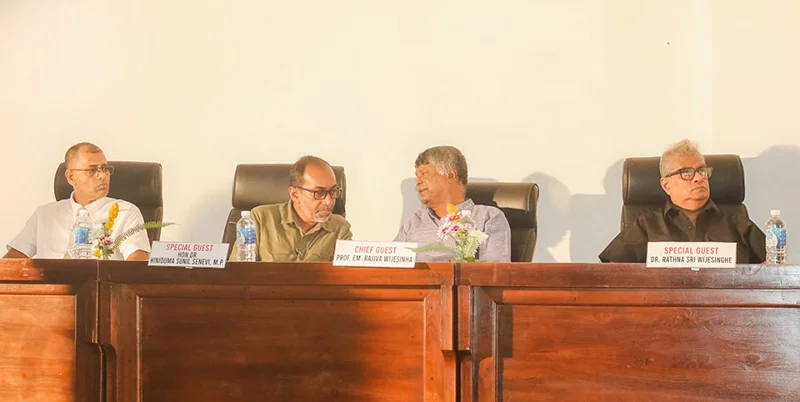
It is said that no man steps into the same river twice, for it is not the same river, and he is not the same man. These words came to mind upon reading Chandana Ruwan Jayanetti’s latest poetry collection, Poems from Galle, which inevitably invites comparison with his earlier work, particularly his first volume of poetry and prose, Reflections in Loneliness: A Collection of Poems and Prose (2015).
In this new collection, Jayanetti is demonstrably not the same poet he was a decade ago. His horizons have widened. his subject matter has diversified, and his thematic range has deepened. The earlier hallmarks of his work, including his empathetic attention to human experience, sensitivity to the natural world, and intimate, reflective tone, remain present. Yet they are now complemented by a stronger defiance, a more deliberate engagement with the political and the cosmic, and a broader mosaic of local and universal concerns. His poetic voice has evolved in scope, tonal range, and thematic ambition.
My own acquaintance with Jayanetti’s poetry dates back to our undergraduate days at Sabaragamuwa University of Sri Lanka, where we were classmates pursuing a BA in Languages (English Special). Even then, his work revealed precise observational skill coupled with profound sympathy for individuals. This early sensibility found fuller articulation in Reflections in Loneliness, a collection spanning nearly two decades of creative endeavor.
That inaugural volume traversed a wide thematic landscape: childhood memories; tender compassion toward humans and animals; tributes to the deserving; the joys and sorrows of young love; and reflections on Sri Lanka’s three-decade Northeast conflict, which concluded in 2009. Jayanetti’s verse, written with sincerity and empathy, moves fluidly from deeply personal to universally human. Moments of striking poignancy include the loss of his wife’s mother, the death of a young friend who marched unflinchingly to the warfront, and the bittersweet parting from a lover.
The prose section of Reflections in Loneliness offered a return to the rural simplicity of the 1970s and ’80s through the perspective of a schoolboy. Essays such as We Buy a Bicycle, Television Descends, The Village Goes to the Fair, Bathing Excursions and Hingurakanda evoke a bygone era with unvarnished authenticity. As literary critic Kamala Wijeratne noted, Jayanetti’s prose merited commendation for its perceptive and affectionate portrayal of rural life, written with the authority of lived experience. His meticulous attention to minute details revealed not only the flaws and frailties of human nature but also its loyalties and quiet virtues, articulated with unforced sympathy.
Consisting of 31 poems and five prose pieces, Reflections in Loneliness established Jayanetti as a writer of elegance, precision, and emotional depth. The current collection, however, confirms the Heraclitean and Buddhist insights: both the poet and his poetry have changed. The new work reflects an expansion from the personal to the cosmic, from the intimately local to the globally resonant, a testament to an artist in motion, carried forward by the ever-changing current of his creative life.
Jayanetti’s poetic corpus in the new book Poems from Galle, spanning thirty-five evocative works from They Heard the Cock Crow to A Birthday Celebration, reveals a profound and consistent artistic signature rooted in themes of humanity, nature, history, and social consciousness. Throughout these poems, Jayanetti demonstrates a distinctive voice that is simultaneously empathetic, contemplative, and alert to the complexities of his Sri Lankan heritage and the broader human condition. While maintaining a core of thematic and tonal consistency, each poem enriches this foundation by expanding into new dimensions of experience, whether personal, ecological, political, or historical.
A foundational element of Jayanetti’s poetry is the intimate relationship between humans and nature, frequently underscored by a deep ethical awareness. In poems like From a Herdman’s Life and My Neighbor, he gives voice to the quiet dignity of rural existence and animal companionship, portraying a symbiotic bond imbued with mutual care and respect. Similarly, Fallen Elephant and Inhumanity lament the cruelty inflicted upon majestic creatures, indicting human greed and violence. These poems articulate not only empathy for the natural world but also an implicit call for stewardship, threading a moral sensibility throughout the collection.
This concern extends to the socio-political sphere, as Jayanetti often situates his poems within the fraught realities of Sri Lanka’s history and struggles. Homage to Sir Henry Pedris honors a national martyr, while Confession of a Sri Lankan Cop exposes institutional corruption and personal integrity in tension. Hanuma Wannama and Gone Are They tackle political violence and social upheaval, reflecting the poet’s engagement with national trauma and collective memory. These works enrich the thematic landscape by connecting personal narrative to larger historical forces.

Jayanetti’s choice of subjects is remarkably diverse yet unified by a focus on lived experience—ranging from the intimate (To a Puppy That Departed, Benji) to the grand (Mekong, A Voyage). The poet’s attention to place, whether the Sri Lankan cityscape in City Morning and Evening from the College Terrace or the historic Ode to Galle Fort, anchors his work in locality while evoking universal themes of time, change, and belonging. Even poems centered on seemingly mundane moments, such as Staff Meeting or A Game, are elevated by the poet’s keen observational eye and capacity to find meaning in everyday rituals.
Moreover, Jayanetti often draws from historical and cultural memory, as seen in Ludowyk Remembered, Let Ho Chi Minh Guide You, and Rathna Sri Remembered, positioning his poetry as a dialogue between past and present. This choice expands his thematic range to include legacy, identity, and the power of remembrance, linking the individual to the collective consciousness.
Across the collection, Jayanetti’s tone is marked by a blend of gentle empathy and quiet strength. Poems such as A Companion Departed and To a Puppy That Departed convey tenderness and mourning with understated poignancy. His voice is intimate and accessible, inviting readers into personal reflections suffused with emotional depth.
Yet, this empathy is balanced by moments of stark realism and defiance.
In Corona and Hanuma Wannama, the tone shifts to urgent and accusatory, critiquing social injustice and political decay. A Ship Weeps mourns environmental devastation with an elegiac voice that is both sorrowful and admonitory. This tonal range reveals a poet capable of both consolation and confrontation, who embraces complexity rather than sentimentality.
While many poems explore specific moments or relationships, others invite contemplation on broader existential and cosmic themes. For instance, A Voyage and Mekong traverse spatial and temporal boundaries, evoking the interplay between human journeys and natural cycles. A Birthday Celebration reflects on legacy, learning, and the continuum of knowledge, blending personal homage with universal insight.
Even poems like A Bond and A Game gesture toward symbolic resonance, the former exploring interspecies loyalty as a metaphor for fidelity and duty, the latter invoking sport as a microcosm of life’s challenges and hopes. These works demonstrate Jayanetti’s ability to expand familiar motifs into metaphoric and philosophical territory, enriching his poetic landscape.
Jayanetti’s thirty-five poems in Poems from Galle collectively reveal a consistent and compelling artistic signature that intertwines compassionate engagement with nature and society, a profound sense of place, and an acute awareness of history and memory. His voice navigates seamlessly between moments of intimate reflection and urgent social commentary, creating a poetic landscape that resonates with both specificity and universality.
Each poem adds a distinct dimension to this mosaic. Historical and political awareness emerges strongly in poems like Let Ho Chi Minh Guide You and Homage to Sir Henry Pedris, where the sacrifices of national heroes and struggles for justice are evoked with reverence and clarity. Meanwhile, environmental consciousness is vividly articulated in works such as Abandoned Chena, Kottawa Forest, and Fallen Elephant, where the fragility of ecosystems and the human impact on nature are poignantly explored.
Jayanetti also delves deeply into themes of personal loss and companionship in poems like Benji, A Companion Departed, and In Memory of Brownie, tenderly capturing the bond between humans and animals. Poems like Confession of a Sri Lankan Cop and Hanuma Wannama offer raw social critique, revealing layers of political and moral complexity.
Through this interplay of historical, environmental, personal, and political themes, Jayanetti constructs a body of work that is distinctly Sri Lankan in its cultural and geographical grounding yet profoundly universal in its exploration of human experience. His poetry invites readers to reflect on the interconnected fates of humans, animals, and the natural world, urging a deeper awareness of our shared existence and responsibilities.
by Saman Indrajith
-

 News6 days ago
News6 days agoStreet vendors banned from Kandy City
-

 Sports3 days ago
Sports3 days agoGurusinha’s Boxing Day hundred celebrated in Melbourne
-

 News6 days ago
News6 days agoLankan aircrew fly daring UN Medevac in hostile conditions in Africa
-

 News1 day ago
News1 day agoLeading the Nation’s Connectivity Recovery Amid Unprecedented Challenges
-

 Sports4 days ago
Sports4 days agoTime to close the Dickwella chapter
-

 Features6 days ago
Features6 days agoRethinking post-disaster urban planning: Lessons from Peradeniya
-

 Features2 days ago
Features2 days agoIt’s all over for Maxi Rozairo
-

 Opinion6 days ago
Opinion6 days agoAre we reading the sky wrong?


